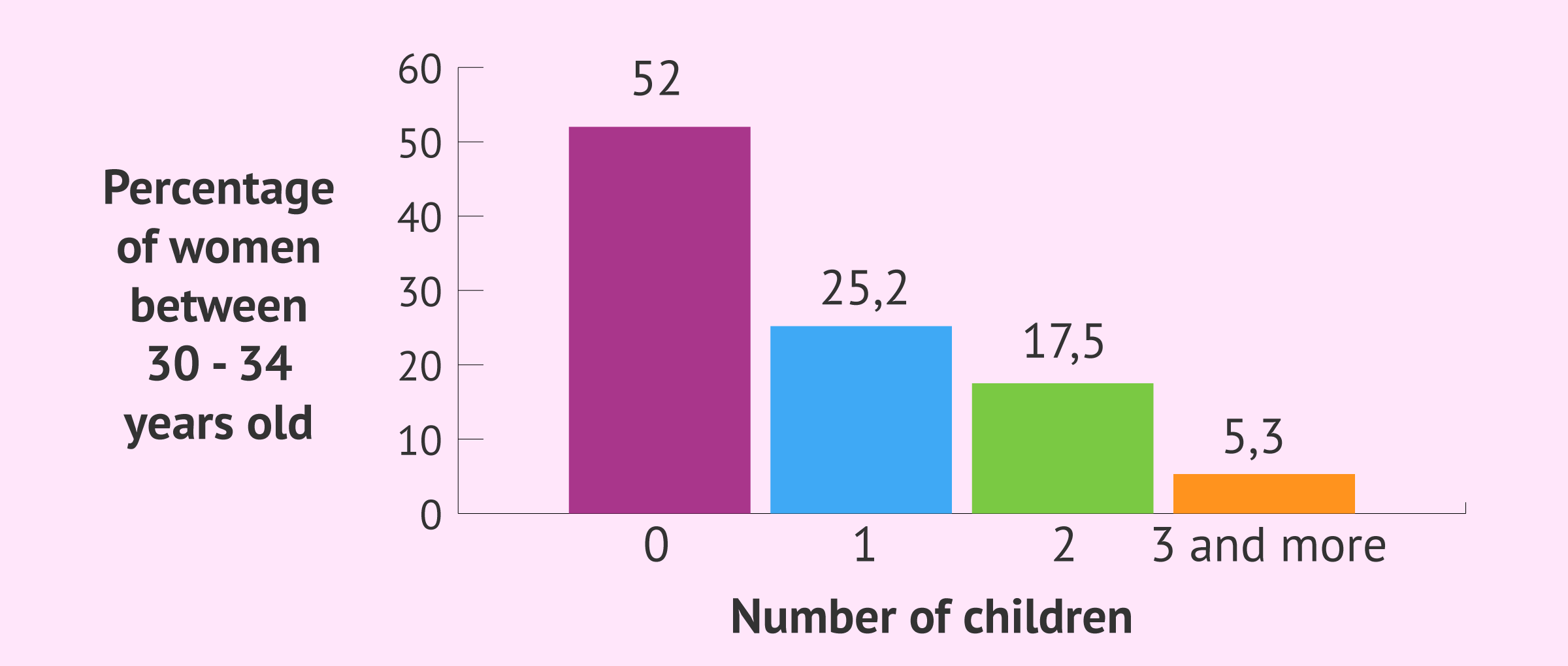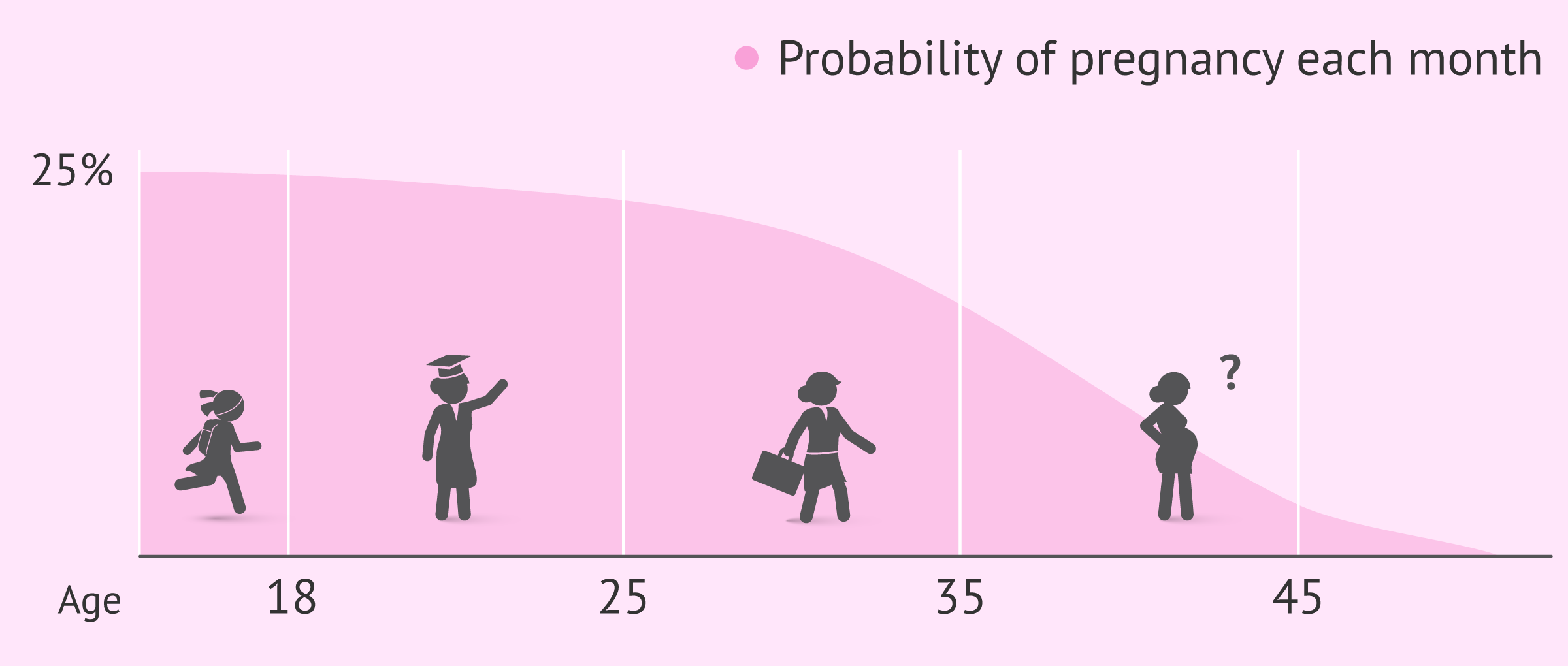In Western countries, approximately 15% of the population of reproductive age has problems in achieving pregnancy. However, the most worrying aspect is that this figure is on an upward trend. Several causes contribute to this increase in infertility cases, including advanced maternal age and declining seminal quality.
However, as infertility cases increase, assisted reproductive techniques are improving, allowing many people to achieve their dream of becoming parents.
Provided below is an index with the 6 points we are going to expand on in this article.
- 1.
- 1.1.
- 2.
- 3.
- 3.1.
- 3.2.
- 3.3.
- 4.
- 5.
- 6.
Maternity delay
The main cause of the increase in infertility in our society is the delay in the desire for motherhood. The incorporation of women into the working world and the effort to develop a professional career have undoubtedly contributed to postpone the moment in which women consider having children.
Achieving economic and labor stability and being able to reconcile it with family life is essential before seeking a pregnancy. In addition, it may take longer to achieve sentimental stability, so the prognosis is that the age to have the first child will be increasingly older.
According to the 2018 Fertility Survey of the National Institute of Statistics (INE), 88.1 % of women between 18 and 30 years old in Spain have not had children. On the other hand, if women between 30 and 34 years of age are considered, 52% have not had children. The remaining 48% have been mothers of one, two, or even three or more children.
However, the body is prepared to reproduce at a certain stage of life, and in women fertility declines dramatically with age.
Fertility consequences
The decline in female fertility begins to be more pronounced at 35 years of age, being much faster from 38-40 years of age. Although at first there may not be a fertility problem, the number and quality of eggs decrease over the years. By the time a woman tries to get pregnant, it may no longer be possible to do so naturally because her oocytes are no longer of sufficient quality to form a viable embryo.
Thus, it is quite possible that women who wish to become mothers at an advanced age may need assisted reproductive techniques to achieve this. Sometimes these patients will have to resort to egg donation.
IVF with donor eggs is probably the most confusing of all fertility treatments, and oftentimes, a misleading one. Transparency is one of our strict selection criteria when it comes to recommending fertility clinics to our readers. You can create your Fertility Report now to filter clinics based on our selection criteria and get an individual report based on your preferences with answers to your queries and most importantly, to prevent potential frauds.
For this reason, one option to consider if childbearing is to be postponed is fertility preservation at a young age through oocyte vitrification. Thus, the eggs can be stored for an indefinite period of time without altering their quality until they can be used in the future to achieve gestation through in vitro fertilization (IVF).
Decrease in semen quality
Although delayed childbearing is the main factor in the increase in infertility cases, it is not the only one involved. Other factors such as decreased semen quality also have an impact on achieving a spontaneous pregnancy.
During the last few years, male infertility has increased in terms of the main sperm parameters. Both the concentration of spermatozoa and their motility have decreased and the morphology is altered, so more and more men are diagnosed with a seminal disorder.
The exact cause of this decline in sperm quality is not known, although everything points to the fact that there is no single factor involved. The pace of life, unhealthy habits and environmental pollutants (even in the fetal period when the testicles are developing) may have contributed to this situation.
Factors that may be influencing this increase in infertility are advanced maternal age and declining seminal quality.
FAQs from users
What is the reason for the decline in semen quality?
There are several factors that can affect a patient's seminal quality. These factors can be divided into four groups: anatomical, hormonal, infectious, and genetic.
In the case of anatomical factors, they can be divided into congenital (from birth) and acquired. Congenital factors may be due, for example, to inadequate formation of the testes or to the testes remaining in the abdominal cavity and not in the scrotal sac. Acquired factors may be due to testicular trauma, tumors or alterations in the circulation of the testicles that cause their sperm production to be inadequate (varicocele).
As for the hormonal factors, it must be explained that the production and maturation of sperm depend on a hormonal cycle that involves different hormones; an imbalance of these hormones can affect seminal quality. To find out if this is the patient's case, it will be enough to do a blood test and assess his hormone levels.
On the other hand, there are infections that can alter seminal quality. These can be viral infections in childhood, which can alter male fertility in adulthood, or infections in adulthood, which affect the testicle or the pathways through which sperm are transported to the testicle.
Finally, there are genetic factors that can cause males to have diminished sperm quality or simply not be able to produce spermatozoa. These are the case of genetic syndromes, such as Klinefelter's syndrome. There are also minor DNA alterations called microdeletions, which can also affect male fertility.
Is there a main cause of the increase in infertility?
Yes, the main cause is the current lifestyle, which is associated with delayed childbearing.
Women are becoming mothers later and later, but female fertility decreases with age (especially after 35 years of age). This is the reason for the increase in fertility problems when they wish to seek pregnancy.
Are there any recommendations to avoid fertility problems?
Yes, there are a number of general recommendations to follow to try to avoid fertility problems. These recommendations are:
- Do not postpone childbearing to an advanced age.
- Avoid unhealthy habits such as smoking, alcohol, excess caffeine ...
- Eat a healthy diet and maintain a healthy weight.
- Get moderate exercise.
- Avoid exposure to environmental pollutants.
Following these guidelines does not ensure pregnancy, but it improves the conditions for it to occur.
Recommended readings
If you want to learn more about the age to become a mother, you can visit the following link: What is the best biological age to become a mother?
If you need to know about seminal quality, we recommend you to read this article: Sperm quality: how to measure it and what to do to improve it.
We make a great effort to provide you with the highest quality information.
🙏 Please share this article if you liked it. 💜💜 You help us continue!
References
García D, Brazal S, Rodríguez A, Prat A, Vassena R. Knowledge of age-related fertility decline in women: A systematic review. Eur J Obstet Gynecol Reprod Biol. 2018 Nov;230:109-118.
Instituto Nacional de Estadística (INE). Encuesta de Fecundidad 2018. (Ver).
Levine H, Jørgensen N, Martino-Andrade A, Mendiola J, Weksler-Derri D, Mindlis I, Pinotti R, Swan SH. Temporal trends in sperm count: a systematic review and meta-regression analysis. Hum Reprod Update. 2017 Nov 1;23(6):646-659.
López-Teijón M, Elbaile M, Alvarez JG. Geographical differences in semen quality in a population of young healthy volunteers from the different regions of Spain. Andrologia. 2008 Oct;40(5):318-28.
Merzenich H, Zeeb H, Blettner M. Decreasing sperm quality: a global problem? BMC Public Health. 2010 Jan 19;10:24.
Mocarelli P, Gerthoux PM, Needham LL, Patterson DG Jr, Limonta G, Falbo R, Signorini S, Bertona M, Crespi C, Sarto C, Scott PK, Turner WE, Brambilla P. Perinatal exposure to low doses of dioxin can permanently impair human semen quality. Environ Health Perspect. 2011 May;119(5):713-8.
Sociedad Española de Fertilidad. Registro Nacional de Actividad 2018-Registro SEF (ver)
Talmor A, Dunphy B. Female obesity and infertility. Best Pract Res Clin Obstet Gynaecol. 2015 May;29(4):498-506.
Virtanen HE, Jørgensen N, Toppari J. Semen quality in the 21st century. Nat Rev Urol. 2017 Feb;14(2):120-130.
Vollenhoven B, Hunt S. Ovarian ageing and the impact on female fertility. F1000Res. 2018 Nov 22;7:F1000 Faculty Rev-1835.
FAQs from users: 'What is the reason for the decline in semen quality?', 'Is there a main cause of the increase in infertility?' and 'Are there any recommendations to avoid fertility problems?'.
Authors and contributors
More information about Cristina Algarra Goosman






Hello, I am 35 years old and I have been trying to get pregnant for a few months but there is no way. Could it be that I can’t get pregnant because I have waited so long? Please help
Hello Lisa29,
Age is a factor that influences conception but it is not the only one, the time trying to conceive and the quality of the gametes are also factors to take into account. If after 6 months of actively trying to conceive you haven’t been able to get pregnant, it may be interesting to visit a fertility specialist so they can test and evaluate if there is any problem preventing you to achieve pregnancy.
I provide you with this free tool where you can get a Fertility report that is based on your characteristics and those of your partner you will get a personalized report with the recommended treatments and the clinics that offer them in your area.
I hope I have helped you.
Best regards.
Hi, I am having a hard time deciding when to try to have a baby, my partner and I are not getting any younger but financially things are not as we would like to have a baby. I am afraid that when we finally decide we will have many problems because of our age.
Hello Mendezo,
Determining the time to have a baby can be complicated. But that does not mean that we should give up the possibility of preserving the fertility we have when we are younger.
I recommend that you consider vitrification of eggs or embryos to increase the possibility of getting pregnant in the future in addition to increasing the quality of the gametes.
I leave you with this article here that explains it all in detail: Fertility preservation.
I hope I have helped you.
Best regards